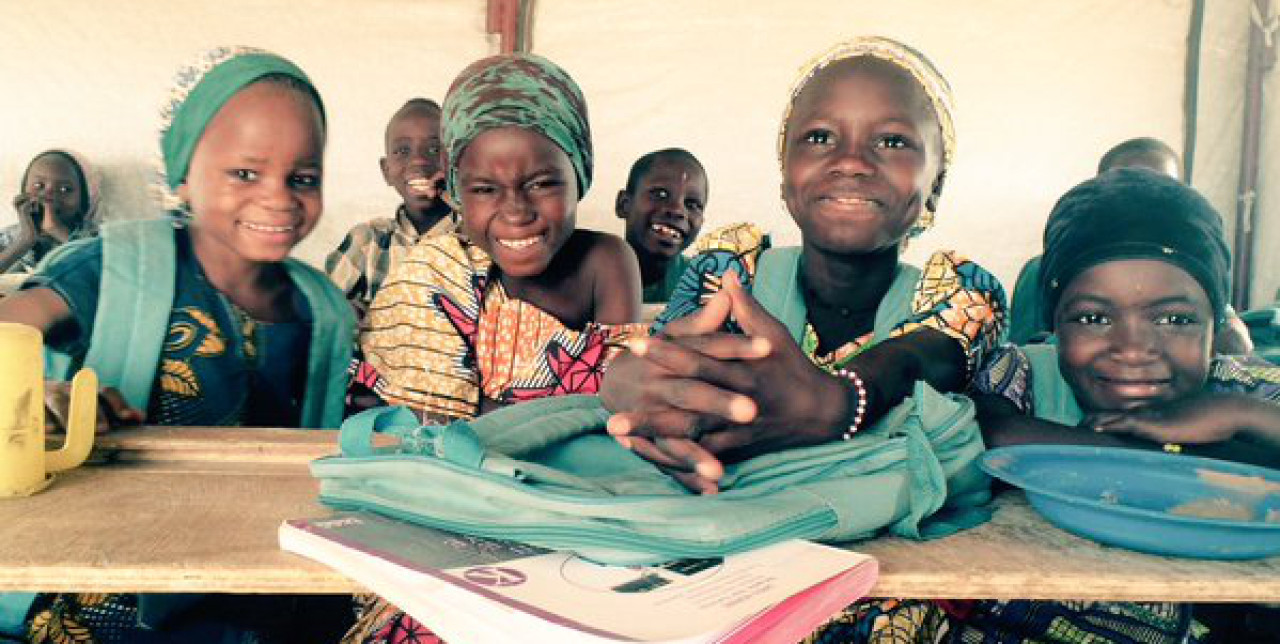05-04-2016 | di COOPI
The European Union invests in the future with COOPI
COOPI , together with other Humanitarian organizations, will carry out education in emergencies-related projects financed by the new funding for humanitarian help announced by the European Commission (ECHO) to support more than 2 millions children in 42 countries. What follows is the press release of the European Commission.
Bruxelles, April 5th 2016- The European Commission has announced today a funding for humanitarian help of 52 millions euro specifically assigned to educational projects for children in situations of emergency in 2016. The funding reflects the engagement previously declared by the Commission to give the instruction 4% of its own budget for humanitarian helps.
The fundings will support more than 2.300.000 children in 42 countries of the whole world and will be assigned to the regions where children are exposed to a higher risk of school exclusion and dropout : Middle East (particularly Siria and Iraq), East- Central and West Africa, Asia, Ucraina, Central America and Columbia.
« Today we hold true to, and even go beyond, our engagement of multiplying the support to education in situations of emergency, going from 1% to 4% of the budget for humanitarian help, in other words from 11 millions euro in 2015 to 52 millions euro in 2016. Investing in the education of children living in areas of conflict or in other emergency situations means to invest to reduce the dangers of a lost generation and to invest for the future. I am proud that the European Union is becoming a leader in this sector.
I would also like to congratulate the European Parliament for its effective efforts directed to assure supplementary fundings from the UE in favor of this action and for its continous support. I ask all the donors of humanitarian helps to follow our example ». So has declared Christos Stylianides, Commissary for humanitarian help and for the management of crises.
Today's funding will support the access to education in emergency situations, among which the education about risks related to mines , competences for life, professional training, recreational activities and psychosocial support. The children will also be able to benefit from the distribution of didactic materials and from the creation of new educational infrastructures. Teachers will also receive training, and so will be the parents and those who are responsible for the children.
The help will be supplied by Non-Governmental Organizations (NGO), Agencies of the United Nations and International organizations. For example, UNICEF will contribute to improve the quality of scholastic enviroment of the children of Aleppo (Siria) by providing solar panels to the schools often hit by blackouts. The Syrian children will approach digital resources in the schools by adopting low-cost computers and tablets . In Ethiopia, Save the Children will improve children's access from refugee fields to quality learning by training teachers and creating or renovating new and safe education areas.
Since 2012 the Commission has increased the financial support to education projects targeted at children living in conflict zones. In 2015 the Commissary Christos Stylianides swore to increase the humanitarian fundings up to 4% for education in emergency situations before the end of the mandate of the Juncker Commission. Thanks to the support of the European Parliament and of the States members of the UE, this increase has been possible since 2016.
More than 23 millions euro have been allocatd so far to education projects in emergency situations, among which the contribution of 500,000 euro by Luxemburg and of 250,000 by Austria in 2014. Until now, more than 1,519,000 children in 26 countries have benedite from them. Thanks to the additional 52 millions euro allocated this year, more than 3.800.000 children in 46 countries will receive help before the end of 2016.
Destinatary countries
Afghanistan, Armenia, Georgia, Burkina Faso,Camerun, Ciad, Niger, Nigeria, Central African Republic, Columbia, Democratic Republic of Congo, Gibuti, Ecuador, Egypt, El Salvador, Etiopia, Guatemala, Honduras, India, Iran, Iraq, Kenya, Libano, Libia, Madagascar, Mali, Mauritania, Myanmar/Birmania, Pakistan, occupied Palestinian Territories, Philippines, Somalia, South Sudan Republic, Sudan, Arabe Sirian Republic, Tanzania, Burundi, Ruanda, Uganda, Ucraina and Yemen.
Partner Humanitarian Organizations that will carry out the projects :
ACTED, Adra, Concern Worldwide,COOPI Cooperazione Internazionale, Croce Rossa, Dan CurchAid, Danish Refugee Council (DRC), Fin Church Aid (FCA), Handicap International, HOPE '87, International Medical Corps, the International Organization of Migration (IOM), International Rescue Committee (IRC), the Lutheran World Federation, Norwegian Refugee Council, Plan International, Plan Spain, SOS Kinderdorf, Save the Children,Terre des Hommes, Triangle, High Commissariat of the Uniteded Nations for the Refugees (UNHCR), UNICEF (United Nations Children's Fund) and War Child.
For further informations
Questions and answers - The UE supports the instruction of children in emergency situations
Statement of education in emergency situations
Contacts for the press :
. Alexandre POLACK (+32 2 299 06 77)
. Daniel PUGLISI (+32 2 299999 06 77)
Information for the public : contact Europe Direct by phone 00 800 67 89 10 11 or by e-mail
You can read the press release in the original language here.




 Somalia
Somalia